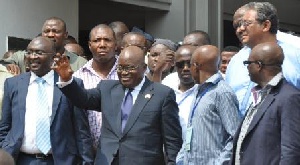Political scientist Dr Kwesi Jonah has said that whatever direction the Supreme Court (SC) ruling on the presidential election petition takes, Ghana will never be the same.
He said the outcome of the petition hearing has the potential of threatening national peace and cohesion, the overstretched security system, constitutional paralysis, and paralysis of central and local government machinery.
He feared the outcome also has the latent of political revenge, poisoned political atmosphere that could spill over into Election 2016, tarnished integrity and weakened legitimacy of the Electoral Commission (EC) and major political reversals.
Dr Jonah made the observation in Accra at a roundtable discussion organized by the Institute of Economic Affairs Thursday on the theme: “Post-electoral disputes resolution: Fostering peace, national cohesion and reconciliation after the Supreme Court ruling".
According to him, the outcome of the petition hearing has the tendency of creating deep seated distrust for the EC, stressing that the remedy would be a thorough reform of the architecture of electoral governance in Ghana.
He added that in the mist of all this upheavals, the energy and resources of the security forces might be stretched to its limits. He therefore urged civil societies and faith-based organizations to educate their members to accept the Supreme Court’s ruling in order to promote national unity and stability.
He called on the media to avoid provocative discussions that could inflame passions and cautioned the parties to avoid victory celebrations and wild jubilations.
Dr Jonah said civil societies must maintain their neutrality and should congratulate the two major parties for keeping Ghana’s peace throughout the hearing and urged them to continue after exhibiting that after the verdict. He also appealed to Ghanaians not to undermine the judiciary by attacking its integrity.
The roundtable discussion was attended by leading political leaders, academia, journalists, legal practitioners, and a cross section of the public.
General News of Friday, 24 May 2013
Source: GNA
Election Petition threatens stability - Kwesi Jonah
Entertainment












